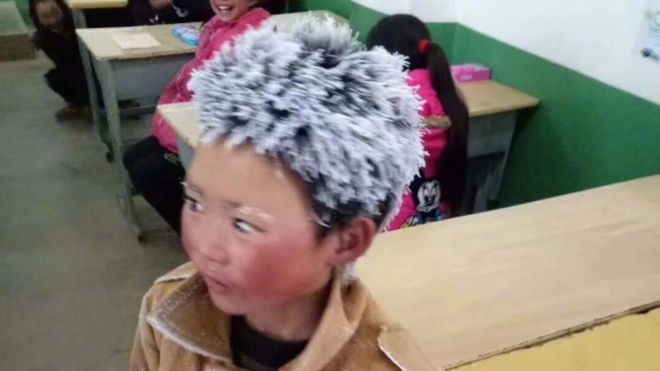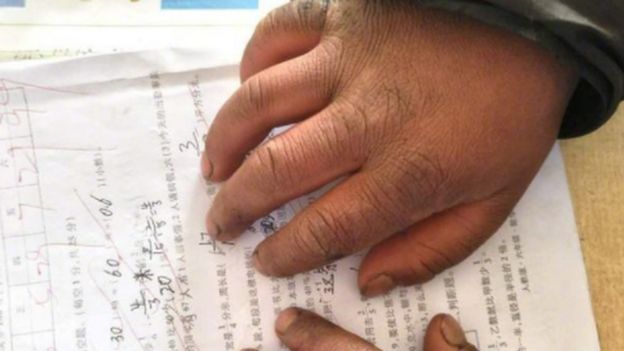| Author |
Message |
 |
|
|
 |
|
Advert
|
Forum adverts like this one are shown to any user who is not logged in. Join us by filling out a tiny 3 field form and you will get your own, free, dakka user account which gives a good range of benefits to you:
- No adverts like this in the forums anymore.
- Times and dates in your local timezone.
- Full tracking of what you have read so you can skip to your first unread post, easily see what has changed since you last logged in, and easily see what is new at a glance.
- Email notifications for threads you want to watch closely.
- Being a part of the oldest wargaming community on the net.
If you are already a member then feel free to login now. |
|
 |
![[Post New]](/s/i/i.gif) 2018/01/16 19:46:40
Subject: The left behind children of China
|
 |

[DCM]
Et In Arcadia Ego
|
the first story :
http://www.bbc.co.uk/news/blogs-trending-42701802
The story of a seven-year-old orphan working as a delivery boy in China has ignited a debate about child poverty and access to education in the country.
A video, posted on the Pear Video website, shows the young boy - nicknamed "Little Li" by social media users - delivering parcels in the eastern Chinese city of Qingdao.
It has been viewed 18 million times.
Pear Video reports Little Li was orphaned after his father passed away and his mother remarried and lost contact with him. The seven-year-old has been living with his father's friend since the age of three.
Little Li's guardian works as a courier and began bringing the boy on his rounds after moving him from a rural area of Shandong province.
The boy now carries out deliveries alone.
The story has been one of the most discussed trends on China's Twitter-like social media platform Sina Weibo.
The reaction to the video from those online has been overwhelmingly sympathetic with many users concerned for the wellbeing of the boy and wishing Little Li a "better life".
One user expressed their sadness at the effect the break-up of the seven-year-old's family had had: "Family problems always affect the children the most."
While many have conveyed their sadness at Little Li's situation, a wider debate has begun about the issue of child poverty in China.
Some users decried Little Li's situation as a "societal tragedy" and pointed to flaws in the country's social security system.
Others commented on the Chinese government's policy to eradicate poverty by 2020, calling it "a distant and indefinite future".
Many raised questions about the acceptability of child labour in Chinese cities and regretted some children are not able to enjoy a happy and carefree childhood.
Some Weibo users took to the platform to urge the local authorities to alleviate Little Li's situation.
One user commented: "What an awesome little guy, I hope the civil affairs department can help crowdfund to give him a better life."
Another wrote: "The relevant departments should help this little boy and prosecute his mother."
As a result of the attention Little Li's story has received from social media users and media outlets, local authorities have confirmed they are looking into the case, the state-run new website China Daily has reported.
Little Li's story is the latest of a number of examples of "left behind children" to cause outrage in China.
While China's state-run media often attempts to control discussions about certain social issues, the plight of poor and abandoned children is a topic that has been widely covered by official outlets, such as China Daily.
Many have drawn parallels between Little Li and the eight-year-old child - nicknamed 'Ice Boy' - seen by hundreds of thousands of people in photos, covered in ice after walking 4.5 km (2.8 miles) to school.
A typical comment read: "From the 'Ice Boy' to a delivery boy, these are all the children of poor families."
Speaking to China Daily, an English-language state-run news organisation, the director of a local children's charity confirmed Little Li was now staying with them and will receive support in accessing education.
Reflecting on the attention social media can shine on the stories of children living in poverty, one user wrote: "Some things that are trending [on Weibo] have a good response, such as the Ice Boy and the Delivery Boy, they've received enthusiastic help from users, who have extended their hearts into the mountains [rural regions]."
ref to the above :
http://www.bbc.co.uk/news/world-asia-china-42639688


An eight-year-old Chinese pupil, dubbed "Ice Boy" by social media users after images emerged of him arriving at school with swollen hands and frost on his hair and eyebrows, has sparked renewed discussion online about child poverty.
Many users say the pictures of "Little Wang", who went viral on Monday, highlight that not enough is being done to help children from poor, rural families in China.
They sympathise with the harsh journeys that Little Wang endures in order to get to his school in Ludian County in the south-western province of Yunnan.
State-run China News Service agency says the boy walks 4.5 km (2.8 miles) to get to school, a journey that takes him an hour. On the day the picture was taken, the temperature was -9C, the agency says.

at age 8.
 http://www.bbc.co.uk/news/world-asia-china-35994481
http://www.bbc.co.uk/news/world-asia-china-35994481
It has been an industrial revolution on steroids.
China has done in a few short decades what it took other countries the best part of a century to complete. And if the pace is extraordinary, then so too is the scale.
Britain had a population of around 10 million when its industrial revolution began - China's today, is more than a hundred times that size.
In the five years to 2013, China's construction industry poured as much cement and its banks lent as much money as the US did in the whole of the 20th Century.
So it should come as no surprise that the social dislocation accompanying this economic upheaval is of a degree that Charles Dickens couldn't have imagined in his wildest dreams.
And nothing highlights the human cost quite like the issue of China's left behind children.
One-fifth of all children in China
Tang Yuwen's story in the animation above is just one among many, many such stories.
His parents work in the textile mills in the city of Chengdu, dragged away from the village by the same forces that took their latter day British counterparts to Manchester a century ago.
The best current estimate suggests that more than 60 million children are growing up in the Chinese countryside while their parents live and work elsewhere, manning the assembly lines and operating the construction machinery at the heart of China's economic miracle.
That's one fifth of all the children in China and, in recent years, the country's state-run media appears to have been given license to discuss the tragic consequences.
In June 2015, four siblings - the youngest just five-years-old - whose parents had left home to work elsewhere killed themselves by consuming pesticide. The China Daily report makes clear it is not an isolated case.
'I miss them so much'
Tang Yuwen lives in the county of Sixian in Sichuan province with his grandmother, his younger brother and his two cousins.
During the week, they spend the time in a one-room apartment a short walk from school.
They're poor. They bathe in a metal tub placed on the floor in the centre of the room and they share a toilet with their neighbours.
All four boys are "left behind children" and over the decades, as millions of workers have streamed out of remote, rural Sichuan, theirs is a common experience.
In Sixian's primary school up to 80% of the pupils are live without their mums or dads.
Modern day China may have been built on the hard graft of its internal migrant labourers, but it has taken a heavy toll from their children too.
The bereavement is all too plain to hear in Tang Yuwen's interview.
"I know it is hard for mum and dad to earn money," he tells me, "but I miss them so much, it is very painful."
In Guizhou province, not far from where the 2015 pesticide poisoning took place, we find 14-year-old Tao Lan, living with her 11-year-old brother, Tao Jinkun.
They are among perhaps China's most shocking child welfare statistic: more than two million left behind children are thought to be living alone, without the support of a close relative.
In a two-room home, with the wind blowing through the gaps in the wooden boards, Tao Lan helps her younger brother with his homework, she grows their own vegetables on a small patch outside and she cooks their meals.
The two take it in turns to wash the dishes.
Their parents live and work more than a thousand miles away, and come back just once a year.
"If you've had a bad day at school it must be very hard not to be able to talk to your mum and dad about it," I suggest to Tao Lan.
"I can't tell them," she replies, and then, wiping tears from her eyes: "Mum and Dad live a hard life, I don't want them to worry about me."
There is, of course, a now accepted view in the West that deprivation and childhood neglect can increase the likelihood of anti-social and criminal behaviour later in life.
But what strikes me when talking to the children we meet in Sichuan and Guizhou is not anger or resentment.
It is instead their readiness to accept with extraordinary maturity that their parents have had to make difficult choices out of economic necessity.
Even so they can't always hide the emotional cost, a tension most visible perhaps in our interview with nine-year-old Zhan Jiayue, a school-mate of Tang Yuwen's.
Spurred on no doubt by the mounting public concern, the government has decided that it needs to be seen to be acting.
It recently issued a new directive, reiterating existing laws against child abandonment and reminding local authorities of their duty to protect vulnerable children.
And now the authorities have announced that they will conduct a nationwide census, the first of its kind, in an attempt to gain a proper account of the number of left behind children.
But the truth is the efforts to enhance enforcement and to gather better data will not do much to address the root causes of the problem.
'I worry about his safety'
The textile factories in the city of Chengdu are just a few hours drive from Tang Yuwen's home village.
But the long hours and the need to save money mean his parents are able to travel home only two or three times a year at best. And yet the obvious solution, taking their children, with them is not an option.
Despite years on the production lines it is almost impossible for them to lose their official migrant status.
China's household registration system means that although they can work wherever they choose, they and their children can only exercise their welfare rights, including access to health care and education, in their home village.
It is a strict system that has allowed China to manage its population flows and, arguably, prevent a common scourge of other industrial revolutions elsewhere; slum developments as whole families flood into the cities in search of a better life.
In a restaurant close to their factories, we show Tang Yuwen's parents the interview we recorded with their son.
It feels an uncomfortable and somewhat cruel device, the kind beloved of TV news reporters in search of dramatic effect, but both parents are keen to see the video.
After all, they haven't seen Tang Yuwen for five months.
Tang Yujun laughs when he sees his 12-year-old boy dressed in formal attire, something I'd taken to be a small, personal flourish of eccentricity amid the drabness of village life. It turns out he's been rifling through Dad's wardrobe.
"That's my tie!" Mr Tang exclaims.
But again, the emotion is just below the surface and we soon glimpse the pain of the enforced separation, this time from the parents perspective, a pain multiplied tens of millions of times across this vast country.
"I'm so worried, because I'm not with him," his mother Liu Ting tells me through her tears. "I worry about his safety. If there were no legal barriers, we would bring him with us."
There is talk about reforming the household registration system, but it will be slow and selective and it is likely to keep the megacities of Beijing, Shanghai and even Chengdu where Tang Yuwen's parent work, out of the reach of many rural families.
The government admits the problem of left behind children is urgent. But for everyone who buys a made-in-China product, or who invests in this still-growing economy, there is a question worth asking.
If this super-sized industrial revolution had taken place within more democratic constraints, might the migrant workers at the centre of it all have been able to demand something fundamental, and so often taken for granted elsewhere?
And might they by now have won that right to a family life?
.. fething hell eh ?! 
They are among perhaps China's most shocking child welfare statistic: more than two million left behind children are thought to be living alone, without the support of a close relative.
... that's kinda mind blowing isn't it eh ?
As well as being somewhat horrific.
How does the expression go again..
Progress, that great heresy of degenerates.
|
The poor man really has a stake in the country. The rich man hasn't; he can go away to New Guinea in a yacht. The poor have sometimes objected to being governed badly; the rich have always objected to being governed at all
We love our superheroes because they refuse to give up on us. We can analyze them out of existence, kill them, ban them, mock them, and still they return, patiently reminding us of who we are and what we wish we could be.
"the play's the thing wherein I'll catch the conscience of the king,
|
|
|
 |
 |
![[Post New]](/s/i/i.gif) 2018/01/17 02:51:35
Subject: The left behind children of China
|
 |

Secret Force Behind the Rise of the Tau
USA
|
As sad as it is, I can't deny that this kid is looking pretty fly here XD There are easier ways to get your hair frosted though.
|
|
|
|
 |
 |
![[Post New]](/s/i/i.gif) 2018/01/17 21:40:52
Subject: The left behind children of China
|
 |

Combat Jumping Rasyat
|
Not to be callous but lots of times these stories are organized pushes by the CPC to highlight social issues or societal behavioral problems that the CPC wants to address. An example would be the recent state organized advertising campaign to treat delivery people with more courtesy.
Not saying anything's wrong with the story or the societal change it's trying to push. You should just be aware not to read Chinese news with the same mindset of Western news, thier editors are deeply in bed with the CPC. A cursory googling of Pear Video should lead you back to the mainstream news org Pengpai.
|
|
This message was edited 1 time. Last update was at 2018/01/17 21:41:21
|
|
|
 |
 |
![[Post New]](/s/i/i.gif) 2018/01/17 21:56:59
Subject: The left behind children of China
|
 |

Pragmatic Primus Commanding Cult Forces
|
 avantgarde wrote: avantgarde wrote:Not to be callous but lots of times these stories are organized pushes by the CPC to highlight social issues or societal behavioral problems that the CPC wants to address. An example would be the recent state organized advertising campaign to treat delivery people with more courtesy.
Not saying anything's wrong with the story or the societal change it's trying to push. You should just be aware not to read Chinese news with the same mindset of Western news, thier editors are deeply in bed with the CPC. A cursory googling of Pear Video should lead you back to the mainstream news org Pengpai.
Well, if the CPC wants to tackle problems in society then that is great isn't it? It is what a good government should be doing.
|
Error 404: Interesting signature not found
     |
|
|
 |
 |
![[Post New]](/s/i/i.gif) 2018/01/17 22:03:23
Subject: The left behind children of China
|
 |

Legendary Master of the Chapter
|
 Iron_Captain wrote: Iron_Captain wrote: avantgarde wrote: avantgarde wrote:Not to be callous but lots of times these stories are organized pushes by the CPC to highlight social issues or societal behavioral problems that the CPC wants to address. An example would be the recent state organized advertising campaign to treat delivery people with more courtesy.
Not saying anything's wrong with the story or the societal change it's trying to push. You should just be aware not to read Chinese news with the same mindset of Western news, thier editors are deeply in bed with the CPC. A cursory googling of Pear Video should lead you back to the mainstream news org Pengpai.
Well, if the CPC wants to tackle problems in society then that is great isn't it? It is what a good government should be doing.
They realistically cant make people do things so they have to make people want to do it.
|
 Unit1126PLL wrote: Unit1126PLL wrote: Scott-S6 wrote: Scott-S6 wrote:And yet another thread is hijacked for Unit to ask for the same advice, receive the same answers and make the same excuses.
Oh my god I'm becoming martel.
Send help!
|
|
|
 |
 |
![[Post New]](/s/i/i.gif) 2018/01/17 22:41:28
Subject: Re:The left behind children of China
|
 |

Ridin' on a Snotling Pump Wagon
|
If people don’t believe similar isn’t happening under the radar in their own country, they’re fooling themselves.
|
|
|
|
 |
 |
![[Post New]](/s/i/i.gif) 2018/01/17 22:46:32
Subject: The left behind children of China
|
 |

Combat Jumping Rasyat
|
 Iron_Captain wrote: Iron_Captain wrote: avantgarde wrote: avantgarde wrote:Not to be callous but lots of times these stories are organized pushes by the CPC to highlight social issues or societal behavioral problems that the CPC wants to address. An example would be the recent state organized advertising campaign to treat delivery people with more courtesy.
Not saying anything's wrong with the story or the societal change it's trying to push. You should just be aware not to read Chinese news with the same mindset of Western news, thier editors are deeply in bed with the CPC. A cursory googling of Pear Video should lead you back to the mainstream news org Pengpai.
Well, if the CPC wants to tackle problems in society then that is great isn't it? It is what a good government should be doing.
I didn't mean it as a criticism, just stating it is what it is. There's value in using state run media to encourage a kind and polite society. But there's trade offs too. You end up limited to discussing and reading about the social issue that the state wants you to discuss. There's not really a free and independent news source in China outside of social media which is still heavily government monitored.
Many Chinese are fine with this so I'm not really here to argue they should try to rock the boat.
|
|
|
 |
 |
![[Post New]](/s/i/i.gif) 2018/01/17 22:52:27
Subject: Re:The left behind children of China
|
 |

Stabbin' Skarboy
|
 Mad Doc Grotsnik wrote: Mad Doc Grotsnik wrote:If people don’t believe similar isn’t happening under the radar in their own country, they’re fooling themselves.
next you’ll be saying the lizard people are real...
|
 3500pts 3500pts 1500pts 1500pts 2500pts 2500pts 4500pts 4500pts 3500pts 3500pts 2000pts 2000pts  2000pts plus several small AOS armies 2000pts plus several small AOS armies |
|
|
 |
 |
![[Post New]](/s/i/i.gif) 2018/01/17 23:34:49
Subject: The left behind children of China
|
 |

The Conquerer
Waiting for my shill money from Spiral Arm Studios
|
So sad.
This hits home too since my little sister was adopted from China. Sad thing is what has been shown for these kids is probably on the better end of the spectrum. Many many others are assuredly faring even worse.
|
Self-proclaimed evil Cat-person. Dues Ex Felines
Cato Sicarius, after force feeding Captain Ventris a copy of the Codex Astartes for having the audacity to play Deathwatch, chokes to death on his own D-baggery after finding Calgar assembling his new Eldar army.
MURICA!!! IN SPESS!!! |
|
|
 |
 |
![[Post New]](/s/i/i.gif) 2018/01/18 20:27:57
Subject: Re:The left behind children of China
|
 |

Ridin' on a Snotling Pump Wagon
|
Not at all.
This sort of nonsense goes on everywhere, even in the wealthiest countries. It’s a damned shame, and all too often swept under the carpet.
|
|
|
|
 |
 |
|
|
|